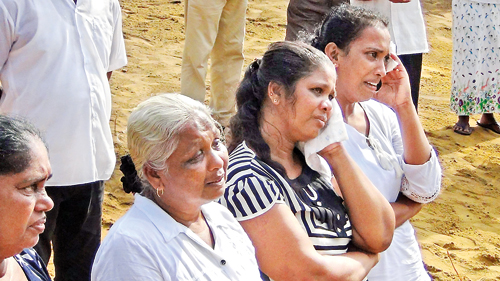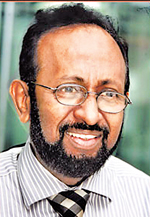After the carnage; a time to heal

Feeling the pain: Mourners at a funeral in Katuwapitiya
Grief and depression mimic each other but there should be no ‘compulsory counselling’ of the survivors of the Easter Sunday bomb blasts.
This is the strong plea going out from Senior Consultant Psychiatrist Dr. Athula Sumathipala who is Director of the Institute for Research & Development. He is also Professor of Psychiatry, Research Institute for Primary Care & Health Sciences, Keele University and Emeritus Professor of Global Mental Health, King’s College London, United Kingdom.
Pointing out that it would be natural for those who have experienced the Easter Sunday tragedy first-hand to feel sad, angry, that it is not worth living or face sleeplessness, he says “these are ‘normal’ feelings even when there has been a natural death of a loved one and more so in an unnatural and violent death”.

Dr. Athula Sumathipala
It will take about six months for these men, women and children to overcome these emotions. We need to remember that it is not pathological and certainly not Post-Traumatic Stress Disorder (PTSD). No one should jump to this conclusion and begin treating them for mental illness. Grief is often misdiagnosed as depression. If there is a doubt after about six months, then that person needs to be taken to a Psychiatrist for a proper evaluation and diagnosis, says Dr. Sumathipala.
He is adamant that there is no need for ‘compulsory counselling’ in the wake of such a tragedy. “Compulsory counselling has been proven to be counter-productive. There is no scientific basis for such compulsory counselling as western scientific literature proves,” this Psychiatrist says.
“The path away from such feelings for these people should be in our cultural context. They should be allowed to engage in the normal rituals of providing a dignified burial for their loved ones. If they wish to talk about their feelings, there should be friends or relatives who will listen to them and provide kind words. Even if they are uncommunicative, there should be strong social support,” he adds.
Meanwhile, focusing on why it is crucial to identify the dead and the missing following a disaster and the best way to do it, Dr. Sumathipala states:
- Identification of bodies and the missing, as well as providing a dignified burial is a vital part of the overall management of a disaster. This is because prolonged, unresolved grief comes about due to the failure to identify missing persons and the lack of information whether loved ones are dead or alive. The knowledge that a missing person is no more provides closure to loved ones, while helping to sort out long-term legal consequences.
- DNA (Deoxyribonucleic acid) technology can be used in the identification of remains because 98% of the genetic make-up of humans is unique to each person.
- Using DNA technology is also less distressing to loved ones from a psychological perspective, rather than carrying out physical identification.
- Dr. Sumathipala adds that a comprehensive forensic service including modern genetic capabilities should be an integral part of the disaster response in Sri Lanka.
| For those between 12 and 20 it’s a new experience | |
| Try not to expose children below 12 years to graphic imagery linked to the recent bomb blast tragedies of Easter Sunday and treat any views expressed by those between 12 and about 20 with sensitivity.Urging that the impact of these terrible incidents on children and young people should not be treated lightly, this is the urgent request being put forward by Dr. Athula Sumathipala.These two groups have not been “inoculated” against this type of imagery, unlike older people who have lived through a 30-year war, according to him. “For this group, it is a new experience.”“Children need to be allowed to ventilate their feelings and if they are inclined to, through techniques such as drawing and painting. The older group should be allowed to express their feelings of anger, hate and revenge. They need to be allowed to verbalize what they are feeling constructively, not destructively, without shutting them out as that would make them internalize their feelings,” stresses Dr. Sumathipala. If young people internalize such feelings, those feelings may erupt in an extreme form later on, he points out, adding that this is why adults such as teachers should be guided and armed to allow young people to say what they have on their minds, followed by a constructive discussion and dialogue without emotion on the pros and cons of such feelings. |


